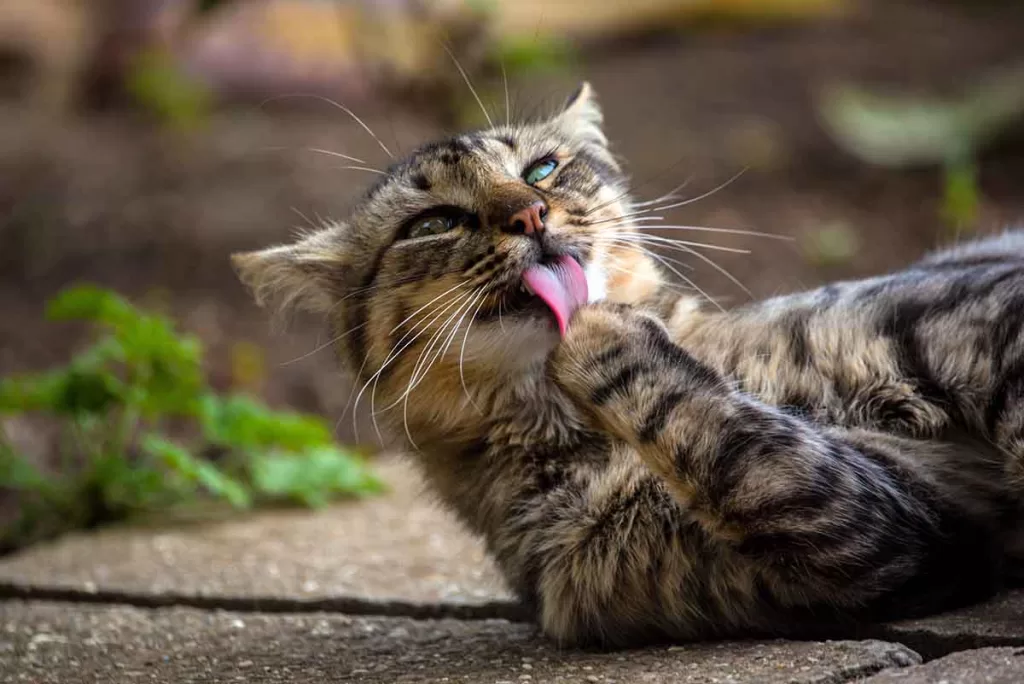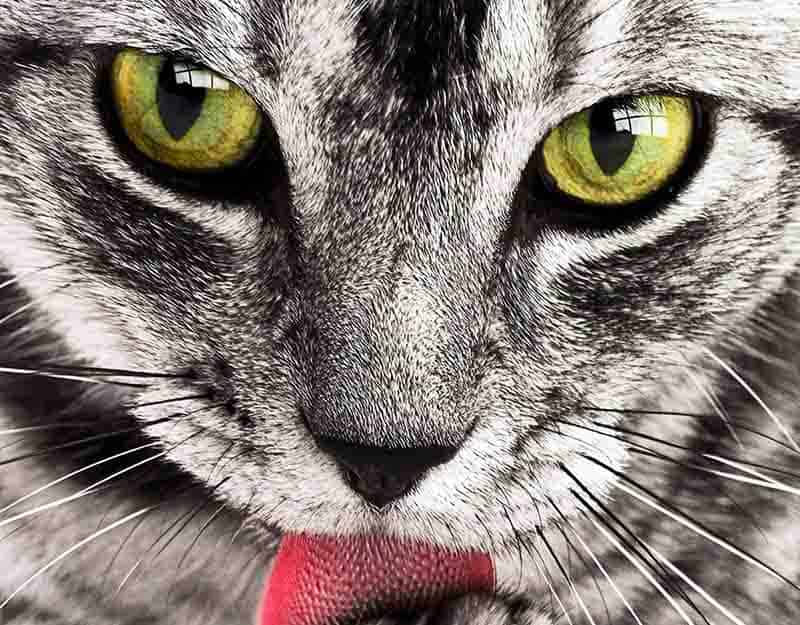If your cat is spending all its time licking, it may seem like just a funny quirk of feline behavior. But if your cat’s regular grooming habits have become excessive or repetitive, there might be more going on than meets the eye.
Constant licking is not normal for cats. Cats may lick themselves excessively due to itchiness caused by allergies, fleas, mites (mange), or ringworm. Cats also lick themselves excessively out of stress or boredom. Excessive licking leads to further health problems and needs to be corrected.
In this article, we’ll explore the various causes of excessive licking in cats. Read on for some valuable insights into why your cat licks itself constantly and what you can do about it.
Why Do Cats Lick Themselves
Cats lick their fur to groom it. This is natural for them, and they have even evolved tools designed to help them keep their fur in tip-top shape: their tongues.
Cat tongues are covered in barbed spines called papillae. These papillae are made of keratin, the same material that their claws are made of. These barbs act like a comb that cats use to remove dirt and debris from their fur, as well as remove loose hairs.
These tongue barbs are the reason why a cat’s tongue feels so rough when it licks your skin. These barbs are abrasive to bare skin, and it doesn’t take more than a few licks for you to feel the sting.
This probably answers my own question of why my Sphynx cat grooms herself less than my Bengal cat. My first thought is that without fur, a hairless cat just doesn’t need to groom as much. But part of it is probably that it doesn’t feel very good for them either!
That said, hairless cats still have the instinct to groom themselves. As I observe my Sphynx cat grooming, I realize she does pretty well at keeping herself clean and tidy. She just doesn’t spend much time licking in one spot before moving on to the next. Can’t say I blame her a bit!
How Much Licking Is Normal For Cats
Cats typically groom themselves more than other animals. It’s natural for cats to lick themselves for about 10 minutes at a time several times throughout the day.
Given that cats sleep on average 15 hours a day, and sleeping 20 hours a day is perfectly normal, they spend a significant amount of their awake time grooming. No wonder sometimes it seems like your cat is always licking itself.
Because frequent grooming is normal for cats, it can be difficult to tell when they are licking themselves excessively.
However, if your cat is licking itself for extended periods (more than 10-15 minutes at a time), is licking at just one spot, or has bald spots or open sores from excessive grooming, then its time to get your cat checked out for an underlying cause.
What Causes Excessive Licking In Cats
Excessive licking can be caused by a range of issues, from physical and medical problems to boredom or anxiety. Here are the most common causes of excessive grooming in cats:
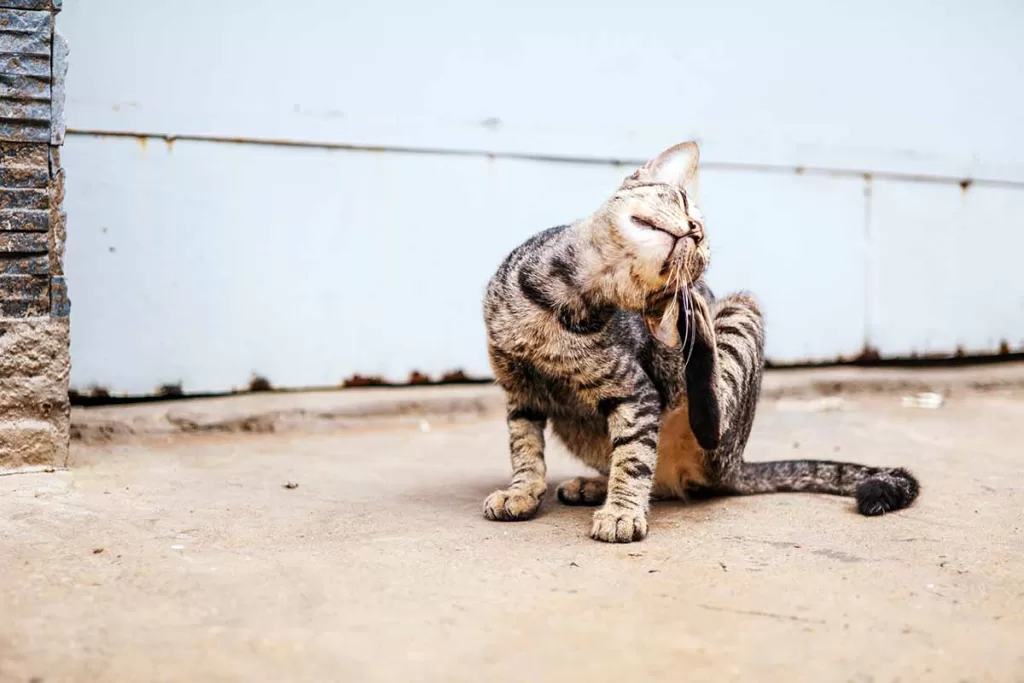
Skin Mites
Cats can get several types of skin mites, which cause intense itching. Cats with mite infestations will lick in an attempt to scratch and soothe itchy skin.
Mite infestation in cats is called cat mange or cat scabies. The mites can make the skin irritated, which may cause itching, hair loss, and inflammation.
All types of mange can easily spread from one animal to another. Several types of mange can significantly affect cats:
- canine scabies
- feline scabies (notoedric mange)
- ear mites (otodectic mange)
- walking dandruff (cheyletiellosis)
- trombiculosis
- fur mites (lynxacariasis)
Cats can also get demodicosis, which is also caused by mites but is not considered mange.
Most types of mange in cats have similar symptoms of itching or scratching, as well as sores, crusty skin, and hair loss.
Fleas
Fleas are one of the most common causes of excessive licking and itching in cats. Flea bites cause intense irritation to cats that often leads to scratching and biting at their fur, as well as excessive licking.
Furthermore, fleas can also spread tapeworms to your cat, which can cause more health problems down the line.
You can read more about how to tell if your cat has fleas and what to do about them by reading our article on the subject, which can be found here.
Ringworm
Ringworm is a fungal infection of the skin and hair, which can cause itching and redness. The fungus that causes ringworm can be spread from cats to people, so it’s important to take proper precautions when handling an infected cat.
Cats with ringworm will often lick and scratch at affected areas in an attempt to soothe the itching.
Ringworm can be treated with antifungal medications, but it’s important to get a proper diagnosis from your veterinarian before beginning treatment. Your veterinarian may also recommend bathing the cat with medicated shampoo and using topical antifungal creams on any affected areas.
Food Sensitivities
A few months after bringing her home, I noticed that my Sphynx cat appeared itchy. While this did not manifest as excessive licking, she was scratching at her head and ears, shaking her head, and constantly rubbing her face against the carpet and other rough surfaces.
I also noticed that she had developed indolent ulcers at the corners of her mouth. These types of ulcers are often caused by an underlying allergic reaction.
Suspecting a food allergy, I switched her food to a hypoallergenic diet. Within two months both the itchiness and ulcers had disappeared.
Cats can have an allergic reaction to ingredients like eggs, beef, wheat, soy, and dairy products, among others. Cats may also react to certain food additives such as preservatives or dyes.
If your cat is having an allergic reaction its skin can become itchy or inflamed, which may lead to excessive licking and scratching.
The best way to diagnose a food allergy is by eliminating foods from your cat’s diet. An elimination trial is the most reliable way to determine whether or not your cat has a food allergy.
If you suspect that your cat has a food sensitivity or allergy it’s important to talk to your veterinarian to get the proper diagnosis and treatment plan.
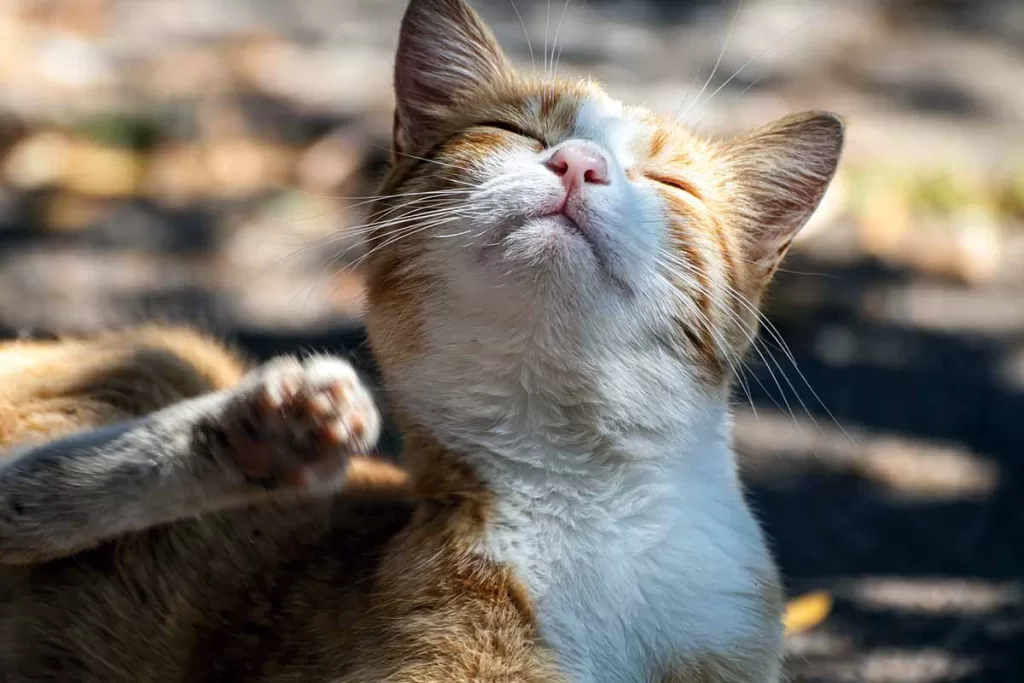
Environmental Allergies
Cats can also be allergic to certain environmental allergens such as pollen, house dust mites, mold, and other airborne particles. They can also have sensitivities to fragrances, much like people can.
Environmental allergies often cause cats to become itchy and lick excessively. It can be difficult to discern whether a cat’s allergies are due to food or if it’s the environment. If a hypoallergenic diet does not resolve your cat’s itchiness, then it’s time to check its environment.
If your cat has environmental allergies, your vet may recommend a medication to reduce the itching and inflammation. Additionally, you can try to minimize exposure to fragrances in your home.
Stress
Sometimes, cats will excessively lick themselves to combat stress. If you notice your cat licking itself more often than usual, it could be because something has changed in its environment.
Cats are creatures of habit and they don’t like changes in routine. A move to a new home, a new pet or person in the household, or a change in routine can all cause stress in cats.
If you are at home less often than normal, this may be causing your cat stress. Conversely, being at home more than normal can also cause stress!
If your cat is licking itself excessively, it’s important to identify the source of the stress and try to reduce it as much as possible. If the problem persists, talk to your veterinarian about medication that can help reduce stress in cats.
You can help reduce stress by providing your cat with plenty of places to hide, toys to play with, and other forms of enrichment. Additionally, establishing a routine will help keep your cat feeling secure which will help minimize its stress.
Boredom
Cats can become bored from lack of activity and stimulation. This can lead to excessive licking as cats may lick themselves out of boredom or to try to self-soothe. This behavior is often seen in cats that are confined in small spaces for long periods.
To reduce boredom, it’s important to provide your cat with plenty of toys and activities that will engage its mind. Cat trees, scratching posts, interactive toys, and even food puzzles can help keep your cat busy and reduce the urge to lick itself out of boredom.
Additionally, spending time playing with your cat will provide it with mental stimulation which can help prevent boredom-related behaviors like excessive licking.
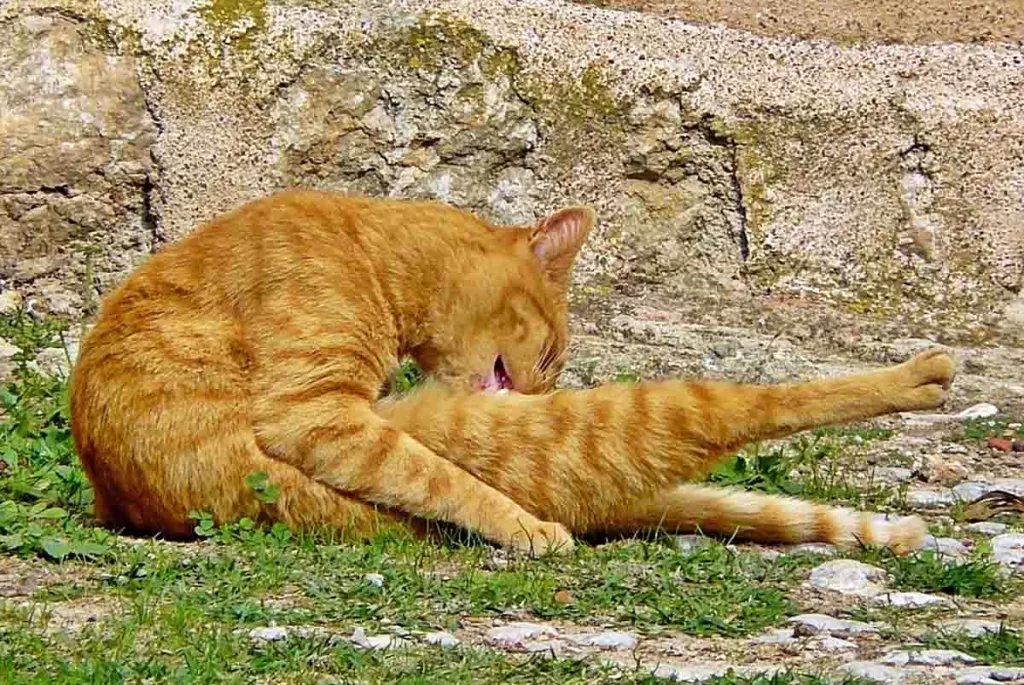
Pain or Discomfort
Cats may also excessively lick themselves if they are in pain or discomfort. The licking is usually restricted to the painful area, such as over an infected joint, in contrast to licking due to fleas or allergies which involves a larger portion of the body.
Matted Fur
Cats that have matted fur may also excessively lick themselves. They may be trying to remove the mats, or they may be licking due to itching and discomfort caused by the matting.
Matted fur can be caused by a variety of reasons such as not being brushed or bathed regularly, living in an unclean environment, conditions causing excessive skin oils, or a reduced ability to groom themselves e.g. due to reduced mobility or obesity.
Signs That Your Cat Is Licking Too Much
Cat owners often don’t know, or can’t tell, that their cat is licking excessively until they see changes to their cat’s fur or skin.
Baldness is often the first thing that is noticed. Cats who lick excessively tend to have a favorite area that they lick constantly. The front legs and the belly are the most common areas.
Once the protective hair is gone, then there is nothing to protect the sensitive skin from the abrasive tongue. The cat continues to lick which damages the skin.
This can lead to red, irritated areas or even open sores. Damaged skin can become infected, leading to pain and more licking, worsening the cycle of excessive licking, hair loss, and skin sores.
What To Do If Your Cat Is Licking Itself Excessively
The best way to stop your cat’s excessive licking is to identify and address the underlying cause.
There are a few things that you can investigate yourself, such as checking your cat for fleas or identifying and eliminating possible stressors in its environment. But in many cases, a visit to your veterinarian is required to figure out what the underlying cause is.
Your vet may recommend a hypoallergenic diet trial if it looks like food could be causing itching or medication to help reduce stress if that appears to be the source of the problem. A mite infestation can usually be treated with topical or oral medications.
In addition, your vet may recommend supplements or a topical product to relieve itching and irritation. Whatever the underlying cause is, it’s important to identify it so that you can take action and stop your cat’s excessive licking.
In some cases, the excessive licking behavior may have become a habit, and it can take time and patience to help your cat break this habit. Behavior modification techniques such as clicker training may be recommended to help stop your cat’s compulsive behaviors.
Conclusion
Excessive licking in cats is not normal behavior, and it can lead to serious problems if left untreated. It’s important to take your cat to the vet so they can identify any underlying medical conditions or environmental stressors causing the issue.
With the right diagnosis and treatment plan, you can help your cat break out of its cycle of excessive licking.
Disclaimer: This article is intended for information purposes only, and does not constitute medical advice. Always consult your veterinarian if you have specific concerns about your pet’s health.
